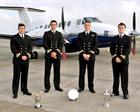Four Observers graduate
Four student Observers graduated from the ‘Basic Flying Training’ course at 750 Naval Air Squadron which teaches fledgling aviators the fundamentals of naval aviation. Although the course has the word ‘basic ’within its title, it is viewed as one of the most intense and challenging courses within the Royal Navy.
Royal Navy aircrew undergo one of the most intensive selection and training programmes in the world. Having started their aviation training on the ‘Grob Tutor’ aircraft at RAF Barkston Heath, Lieutenant Edwards, Lieutenant Donnell Fairweather, Lieutenant Chris Bugg and Lieutenant Tim Dunning were then sent to Royal Naval Air Station Culdrose to spend a few months under the wing of 750 Naval Air Squadron - the home of Royal Naval Observer training.
During their 16 week course, the trainees learnt the skills that are required of a frontline ‘Tactical Mission Commander’, including airmanship, navigation and radar analysis. The course involved on-ground training within the Squadron’s simulators and airborne education within ‘flying classrooms’, onboard one of the unit’s KingAir Avenger aircraft.
On completion of their studies at 750 Naval Air Squadron, the students will now go on to the next phase of their training on either Wildcat Maritime Attack helicopters at Royal Naval Air Station Yeovilton or the Merlin MK 2 anti-submarine helicopters at Royal Naval Air Station Culdrose.
At the awards ceremony, all four students were presented with their certificates by the Commanding Officer of Royal Naval Air Station Culdrose, Captain Mark Garratt.
The Commanding Officer of 750 Naval Air Squadron, Lieutenant Commander Craig Whitson-Fay said of the course: “This is a really important milestone in the aviation careers of the Observer students; they have proven they have what it takes to operate the aircraft safely in challenging conditions and under pressure. They must now take that essential knowledge forward to their respective operational conversion units and apply it to the front-line helicopter type. The important foundations they have laid here at 750 NAS will stay with them for the rest of their careers.”



